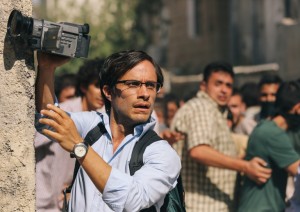The CIA’s Work With Hollywood Filmmakers
Puts All Media Workers at Risk...

Vice’s Jason Leopold (4/6/16)
has uncovered documents showing the CIA had a role in producing up to
22 entertainment “projects,” including History Channel documentary Air
America: The CIA’s Secret Airline, Bravo‘s Top Chef: Covert Cuisine, the
USA Network series Covert Affairs and the BBC documentary The Secret
War on Terror—along with two fictional feature films about the CIA that
both came out in 2012.
The CIA’s involvement in the
production of Zero Dark Thirty (effectively exchanging “insider” access
for a two-hour-long torture commercial) has already been well-established,
but the agency’s role in the production of Argo—which won the Best
Picture Oscar for 2012—was heretofore unknown. The extent of the CIA’s
involvement in the projects is still largely classified, as Leopold
notes, quoting an Agency audit report:
However, because of the lack of adequate records, we were unable to determine the extent of the CIA’s support to the eight projects, the extent to which foreign nationals participated in CIA-sponsored activities, and whether the Director/OPA approved the activities and participation of foreign nationals…. Failure on the part of CIA officers to adhere to the regulatory requirements could result in unauthorized disclosures, inappropriate actions and negative consequences for the CIA.
The CIA’s history of producing or
helping to produce films goes back decades. The Agency, for example,
secretly bought the rights to Animal Farm after Orwell’s death in 1950
and produce an animated adaptation centered on demonizing the Soviet Union rather than capturing Orwell’s broader critiques of power.

John
Goodman played a moviemaker working with CIA agent Ben Affleck to
produce a fake film in the Oscar-winning Argo. It turns out there were
real CIA agents working with the real movie-makers to make the actual
film Argo.
And as the CIA got involved in film production, Hollywood players have likewise taken part in covert operations. For years, legendary film producer Arnon Milchan (Pretty Woman, Fight Club, back-to-back Oscar winner for Best Picture in 2014 and 2015)
worked for Israeli intelligence to deal arms and obtain technologies
Israel needed to make nuclear weapons. “At the peak of his activities,” according to the Guardian,
he was “operating 30 companies in 17 countries and brokering deals
worth hundreds of millions of dollars,” an arrangement that, Milchan
told the BBC (11/26/13), involved Sydney Pollack—director of Sabrina, Tootsie and, ironically enough, Three Days of the Condor.
In such revelations, an important point
is often overlooked: The CIA assisting or posing as filmmakers,
journalists and other creative roles—a practice the Agency reserves the right to partake in
to this day—puts actual filmmakers, journalists and other creators at
risk overseas. It’s an important piece of context that’s rarely
addressed by a pundit class who is (rightfully) outraged at American
journalists and filmmakers being detained as spies overseas, but
responds with praise or amusement when CIA takes on such roles as cover.
The amnesia at work is impressive. Jon Stewart’s film Rosewater,
about Iran detaining Iranian-Canadian journalist and filmmaker Maziar
Bahari in 2009 on charges of spying, came out a mere 18 months after Argo won Best Picture for depicting the CIA using phony filmmakers to do just that. We praise the latter without acknowledging the glaring fact that it helps set the stage for the former.

In
Rosewater, Gael Garcia Bernal plays Maziar Bahari, a Western journalist
held by Iran as a spy after he reports on violence against protesters.
This isn’t to suggest Iran doesn’t
detain legitimate journalists and filmmakers for simply publishing
uncomfortable truths—as it did in the case of Bahari and Washington Post’s Jason Rezaian
in 2014—but American media’s cozy relationship with the CIA and other
intelligence agencies makes the possibility of overcompensation by Iran
and other unfriendly governments that much more likely, and makes the
pretense that legitimate journalists are suspected of espionage that
much more plausible.
Indeed, this is a position advanced by Associated Press
reporter Terry Anderson, who spent six years detained by Hezbollah and
now lobbies aggressively against these suspect practices. As Martha
Bayles and Jeffrey Gedmin wrote in a Boston Globe op-ed last year (1/4/15):
First, such practices make honest journalism more dangerous. Ask Terry Anderson, the Associated Press reporter who in 1985 was taken captive by Hezbollah, which accused him of being a CIA agent. After being released in 1991, Anderson became an eloquent voice arguing against blurring the distinction between newsgathering and espionage.
This is not to suggest that if the CIA’s policy were less murky and problematic, the Taliban would not have murdered Wall Street Journal reporter Daniel Pearl, or the Azerbaijan ruling party would not be trying to discredit Khadija Ismayilova. But when it comes to managing risk, a definite ban on the recruitment of journalists would constitute a positive step. Not only that, but the lack of such a ban erodes the trust of America’s allies and provides fuel to its adversaries.
The same is true for filmmakers. While it appears the CIA’s involvement in the entertainment “products” revealed by Vice
was to provide access in exchange for steering the message (as opposed
to using the filmmakers for intelligence-gathering), the spectacle of
Hollywood teaming up with US intelligence agencies to make
propaganda—especially given the dodgy historical context—no doubt stokes
the fears of countries already hostile to Americans within their
borders.
This isn’t to say that if the CIA bans
the practice of recruiting journalists and assisting the production of
films, other countries still won’t be paranoid (justifiably or not), or
that such a restriction would even be respected. But when the CIA blurs
the lines between covert intelligence gathering and legitimate media,
the reaction of media people shouldn’t be amusement, much less awards.
Every time this type of behavior is normalized, or shrugged off, or made
sexy, real journalists and real filmmakers overseas are put further at
risk.
Adam Johnson is a contributing analyst for FAIR.org. Follow him on Twitter at @AdamJohnsonNYC.
The original source of this article is FAIR
Copyright © Adam Johnson, FAIR, 2016



No comments:
Post a Comment